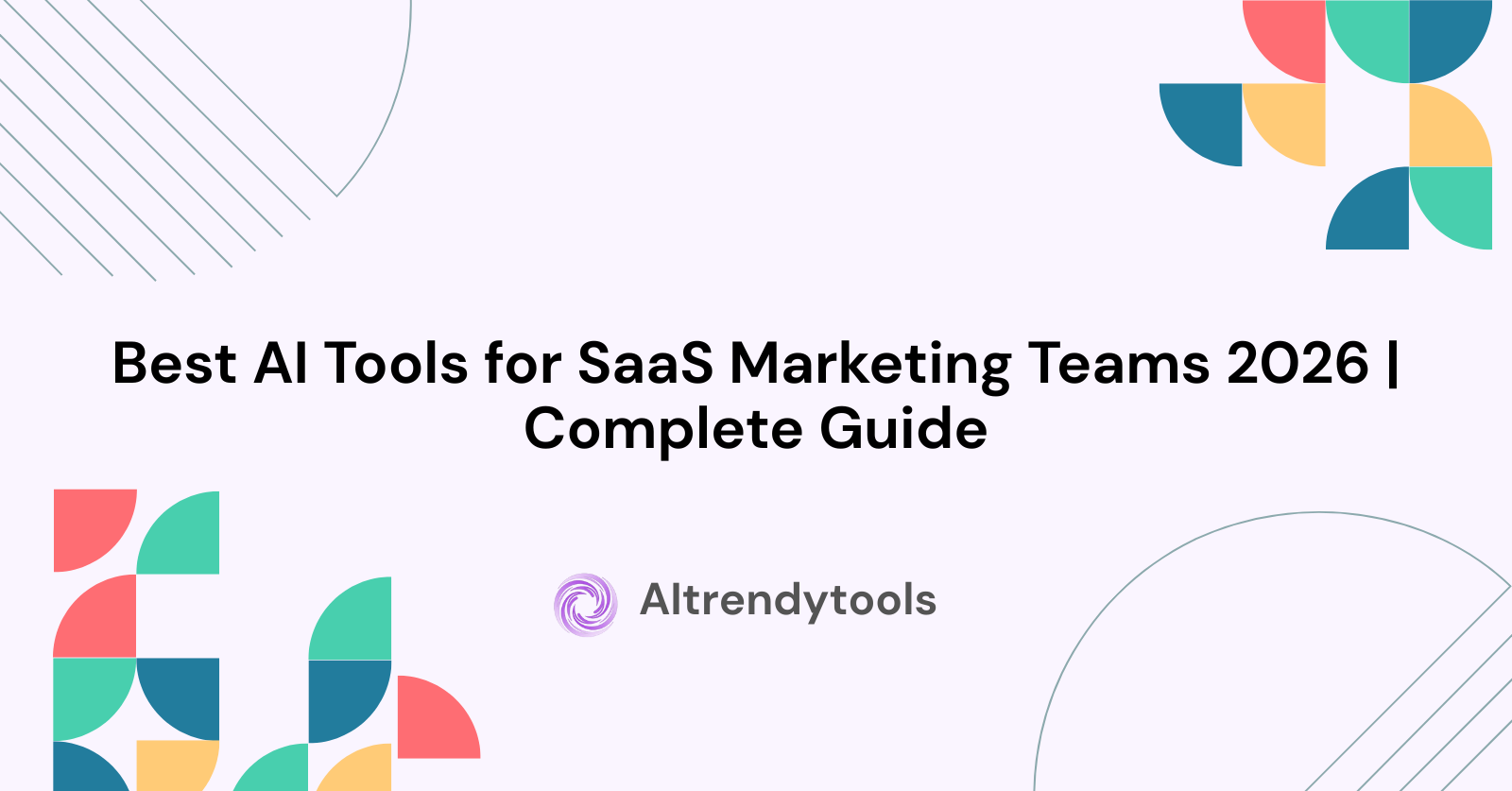🔥 AITrendytools: The Fastest-Growing AI Platform |
Write for usBest AI Tools for SaaS Marketing Teams 2026 | Complete Guide
Discover top AI marketing tools for SaaS teams in 2026. Comprehensive guide covering automation, analytics, content creation & growth strategies.
Sep 16, 2025
SaaS marketing teams face unprecedented challenges in 2026 as competition intensifies and customer acquisition costs continue rising. Artificial intelligence has become essential for maintaining competitive advantage and driving sustainable growth in the software-as-a-service industry.
Modern AI tools empower marketing teams to automate repetitive tasks, personalize customer experiences, and extract actionable insights from vast amounts of data. These technologies enable smaller teams to achieve results that previously required extensive resources and manpower.
The AI marketing landscape has evolved dramatically, offering sophisticated solutions for content creation, lead generation, customer segmentation, and performance optimization. SaaS companies leveraging these tools report 35% higher conversion rates and 28% lower customer acquisition costs compared to traditional marketing approaches.
Understanding which AI tools deliver the most value for SaaS marketing objectives helps teams allocate budgets effectively and maximize return on investment. This comprehensive guide examines the most impactful AI solutions available for SaaS marketing teams in 2026.
AI Marketing Automation Tools for SaaS Growth
Marketing automation powered by artificial intelligence transforms how SaaS companies nurture leads and convert prospects into paying customers. These platforms analyze user behavior patterns to deliver personalized messaging at optimal timing across multiple channels.
HubSpot's AI-powered marketing automation suite leads the market with sophisticated lead scoring algorithms and predictive analytics capabilities. The platform identifies high-intent prospects and automatically triggers targeted campaigns based on user actions and demographic data.
Marketo Engage utilizes machine learning to optimize email send times, subject lines, and content personalization for maximum engagement rates. The platform's AI algorithms continuously learn from campaign performance to improve future results.
Key automation features include:
- Behavioral trigger campaigns based on user actions
- Dynamic content personalization using AI algorithms
- Predictive lead scoring and qualification
- Automated email sequence optimization
- Cross-channel campaign orchestration
ActiveCampaign combines email marketing with AI-driven customer journey mapping to create seamless user experiences. The platform's machine learning capabilities predict the most effective touchpoints for individual prospects.
Automation tools reduce manual workload by 60% while improving campaign performance through data-driven decision making. SaaS teams can focus on strategic initiatives while AI handles routine marketing tasks efficiently.
AI Content Creation Tools for SaaS Marketing
Content creation represents one of the most time-intensive aspects of SaaS marketing, making AI-powered writing tools invaluable for scaling content production. These platforms generate high-quality articles, social media posts, and marketing copy tailored to specific audiences.
Jasper AI specializes in marketing copy creation with templates designed specifically for SaaS companies. The platform understands technical terminology and can produce compelling product descriptions, feature announcements, and case studies.
Copy.ai excels at generating multiple variations of marketing messages for A/B testing purposes. The tool creates headlines, ad copy, and email subject lines optimized for different customer segments and campaign objectives.
Content creation benefits include:
- Blog post generation with SEO optimization
- Social media content calendars and posts
- Email marketing copy and subject lines
- Product description and landing page content
- Video script writing and podcast outlines
Writesonic offers specialized tools for creating technical documentation and help center articles. The platform understands complex software concepts and translates them into user-friendly explanations.
Content teams using AI tools report 40% faster content production while maintaining quality standards. These platforms serve as creative partners rather than replacements for human writers, enhancing productivity and inspiration.
AI Analytics and Data Intelligence Platforms
Data analytics powered by artificial intelligence provides SaaS marketing teams with deeper insights into customer behavior, campaign performance, and revenue attribution. These platforms process massive datasets to identify patterns and opportunities invisible to human analysis.
Google Analytics 4 incorporates machine learning to predict customer lifetime value and identify users most likely to convert. The platform's AI-powered insights help marketing teams allocate budget toward highest-value prospects.
Mixpanel's AI capabilities analyze user event data to identify friction points in the customer journey and recommend optimization opportunities. The platform tracks product usage patterns to inform marketing messaging and positioning strategies.
Advanced analytics features encompass:
- Predictive customer lifetime value modeling
- Churn risk prediction and prevention strategies
- Revenue attribution across marketing channels
- User behavior pattern recognition
- Automated anomaly detection and alerts
Amplitude combines product analytics with AI-driven cohort analysis to understand how different user segments interact with SaaS products. These insights inform targeted marketing campaigns and feature development priorities.
AI analytics platforms help marketing teams make data-driven decisions rather than relying on intuition. Teams report 25% improvement in campaign ROI when using AI-powered analytics compared to traditional reporting methods.
AI Social Media Management Tools
Social media marketing for SaaS companies requires consistent posting, community engagement, and performance monitoring across multiple platforms. AI-powered social media tools automate content scheduling, optimize posting times, and analyze competitor strategies.
Hootsuite's AI features include content suggestion engines that recommend trending topics and hashtags relevant to SaaS audiences. The platform analyzes engagement patterns to determine optimal posting schedules for maximum reach.
Buffer utilizes machine learning to analyze post performance and suggest content improvements. The platform's AI algorithms identify which types of content resonate best with specific audience segments.
Social media automation includes:
- Automated content scheduling across platforms
- AI-generated hashtag recommendations
- Competitor analysis and benchmarking
- Engagement monitoring and response suggestions
- Performance analytics and optimization insights
Sprout Social combines social listening with AI sentiment analysis to monitor brand mentions and customer feedback. The platform identifies potential issues early and suggests appropriate response strategies.
SaaS companies using AI social media tools see 30% higher engagement rates and save 15 hours per week on manual posting tasks. These platforms enable consistent brand presence while maintaining authentic community interactions.
AI Email Marketing Optimization Tools
Email marketing remains crucial for SaaS customer acquisition and retention, with AI tools significantly improving open rates, click-through rates, and conversion performance. These platforms optimize every aspect of email campaigns through machine learning algorithms.
Mailchimp's AI capabilities include send-time optimization, subject line suggestions, and content personalization based on subscriber behavior. The platform predicts which email variations will perform best for different audience segments.
Klaviyo specializes in behavioral email marketing with AI-powered segmentation and predictive analytics. The platform identifies customers likely to churn and automatically triggers retention campaigns.
Email optimization features include:
- Subject line A/B testing and optimization
- Send-time optimization for individual subscribers
- Dynamic content personalization
- Automated segmentation based on behavior
- Predictive analytics for campaign performance
ConvertKit uses AI to analyze subscriber engagement patterns and recommend content strategies for maximum impact. The platform's automation features nurture leads through personalized email sequences.
SaaS companies implementing AI email marketing report 45% higher open rates and 35% better conversion rates compared to traditional email campaigns. These tools transform email from batch-and-blast to highly targeted communication.
AI Customer Segmentation and Personalization
Customer segmentation powered by artificial intelligence enables SaaS marketing teams to create highly targeted campaigns based on behavior, preferences, and predictive analytics. These tools identify micro-segments and personalization opportunities at scale.
Segment's AI-powered customer data platform unifies user information from multiple touchpoints to create comprehensive customer profiles. The platform identifies hidden patterns in user behavior for more effective targeting.
Dynamic Yield specializes in real-time personalization using machine learning algorithms. The platform adapts website content, email messages, and product recommendations based on individual user behavior.
Segmentation capabilities include:
- Behavioral segmentation based on product usage
- Predictive segmentation for future actions
- Real-time personalization across channels
- Lookalike audience creation for paid advertising
- Custom attribute modeling for niche markets
Optimizely combines experimentation with AI-driven personalization to test and optimize customer experiences. The platform identifies which personalization strategies drive the highest conversion rates.
Personalized marketing campaigns generate 6x higher transaction rates for SaaS companies. AI segmentation tools enable marketing teams to deliver relevant messages to the right customers at optimal moments.
AI Lead Generation and Prospecting Tools
Lead generation represents a critical challenge for SaaS marketing teams, with AI-powered prospecting tools dramatically improving lead quality and conversion rates. These platforms identify ideal prospects and automate outreach sequences.
ZoomInfo utilizes AI to analyze company data and identify prospects matching ideal customer profiles. The platform provides detailed contact information and company insights for targeted outreach campaigns.
Apollo combines prospecting with AI-powered sequence automation for scalable lead generation. The platform analyzes response patterns to optimize outreach timing and messaging for higher reply rates.
Lead generation features encompass:
- Ideal customer profile matching and identification
- Contact enrichment and data verification
- Automated outreach sequence optimization
- Response tracking and analysis
- Integration with CRM systems for seamless workflow
Outreach.io uses machine learning to optimize sales cadences and predict which prospects are most likely to respond. The platform provides AI-powered coaching suggestions for improving outreach effectiveness.
SaaS companies using AI prospecting tools report 50% higher qualified lead generation rates while reducing manual research time by 70%. These platforms enable marketing teams to focus on high-value activities rather than data gathering.
AI Chatbots and Conversational Marketing
Conversational marketing through AI-powered chatbots provides instant customer support while qualifying leads and guiding prospects through the sales funnel. These tools operate 24/7 to capture and nurture potential customers.
Intercom's AI chatbot Resolution Bot handles common customer inquiries and seamlessly transfers complex issues to human agents. The platform learns from customer interactions to improve response accuracy over time.
Drift specializes in conversational marketing with AI chatbots designed specifically for B2B lead qualification. The platform identifies high-intent visitors and routes them to appropriate sales representatives.
Chatbot capabilities include:
- Automated lead qualification and scoring
- 24/7 customer support and FAQ responses
- Meeting scheduling and calendar integration
- Product demo booking and information delivery
- Seamless handoff to human agents when needed
Zendesk's Answer Bot uses natural language processing to understand customer questions and provide relevant help articles. The platform reduces support ticket volume while improving customer satisfaction scores.
Companies implementing AI chatbots see 35% faster lead response times and 25% higher conversion rates from website visitors. These tools capture leads that might otherwise leave without engaging.
AI Advertising and PPC Optimization
Paid advertising optimization through artificial intelligence helps SaaS companies maximize return on ad spend while reducing manual campaign management time. These platforms automatically adjust bids, targeting, and creative elements for optimal performance.
Google Ads Smart Bidding uses machine learning to optimize bids in real-time based on conversion likelihood. The platform considers hundreds of signals to maximize conversions within budget constraints.
Facebook's AI advertising tools automatically test ad variations and allocate budget toward highest-performing creative elements. The platform identifies audience segments most likely to convert and scales successful campaigns.
PPC optimization features include:
- Automated bid management and optimization
- Audience targeting refinement using AI
- Creative testing and performance analysis
- Budget allocation across campaigns and platforms
- Conversion tracking and attribution modeling
Microsoft Advertising incorporates AI for audience expansion and smart campaign optimization. The platform identifies similar users to existing customers for lookalike targeting strategies.
SaaS companies using AI advertising tools achieve 40% better return on ad spend while reducing campaign management time by 60%. These platforms enable more efficient budget allocation and campaign scaling.
AI SEO and Content Optimization Tools
Search engine optimization for SaaS companies requires understanding technical topics and creating content that ranks for relevant keywords. AI-powered SEO tools analyze search patterns and optimize content for better visibility.
Surfer SEO uses artificial intelligence to analyze top-ranking pages and provide content optimization recommendations. The platform suggests keyword usage, content length, and structural improvements for better search rankings.
MarketMuse employs AI to identify content gaps and opportunities within specific topic clusters. The platform helps SaaS companies create comprehensive content strategies that establish topical authority.
SEO optimization includes:
- Keyword research and opportunity identification
- Content gap analysis and topic clustering
- On-page optimization recommendations
- Technical SEO auditing and improvements
- Competitor content analysis and insights
Clearscope analyzes search intent and provides AI-driven content briefs for writers. The platform ensures content meets searcher expectations while optimizing for target keywords.
Resources like AI Trendy Tools provide comprehensive directories of AI-powered marketing solutions, helping teams discover and evaluate new technologies for their specific needs.
SaaS companies implementing AI SEO tools report 55% improvement in organic traffic growth and 30% better keyword ranking performance. These platforms ensure content strategies align with search engine algorithms and user intent.
AI Revenue Attribution and ROI Analysis
Revenue attribution represents a complex challenge for SaaS marketing teams managing multiple touchpoints and lengthy sales cycles. AI-powered attribution tools provide accurate insights into which marketing activities drive actual revenue growth.
HubSpot's AI attribution modeling tracks customer journeys across multiple touchpoints to assign revenue credit appropriately. The platform identifies which marketing channels and campaigns contribute most to customer acquisition.
Bizible (now Adobe Marketo Measure) uses machine learning to create custom attribution models based on specific business characteristics. The platform provides granular insights into marketing ROI at the campaign and channel level.
Attribution capabilities encompass:
- Multi-touch attribution modeling across channels
- Customer journey analysis and visualization
- Marketing influence on pipeline and revenue
- Campaign performance measurement and optimization
- Budget allocation recommendations based on ROI
Salesforce Einstein Attribution analyzes sales data to identify patterns in successful customer acquisitions. The platform helps marketing teams understand which activities drive the highest-value customers.
Teams using AI attribution tools make more informed budget decisions and improve marketing ROI by 25% through better resource allocation. These insights enable data-driven marketing strategies that focus on revenue generation.
AI Competitive Intelligence Tools
Competitive intelligence powered by artificial intelligence helps SaaS marketing teams monitor competitor activities, pricing strategies, and market positioning. These tools provide insights for strategic decision-making and competitive advantage.
Crayon utilizes AI to track competitor websites, pricing changes, and marketing campaigns automatically. The platform identifies competitive threats and opportunities in real-time.
Klenty combines sales intelligence with competitive analysis to identify prospects switching between SaaS solutions. The platform provides insights into competitor customer acquisition strategies.
Competitive intelligence features include:
- Automated competitor monitoring and alerts
- Pricing strategy analysis and tracking
- Marketing campaign identification and analysis
- Feature comparison and gap analysis
- Market positioning and messaging insights
SimilarWeb uses AI to analyze competitor website traffic, audience demographics, and marketing channels. The platform provides benchmarking data for strategic planning purposes.
SaaS companies leveraging competitive intelligence tools respond 40% faster to market changes and identify 30% more growth opportunities compared to manual research approaches.
AI Customer Retention and Churn Prevention
Customer retention represents a critical metric for SaaS success, with AI-powered tools identifying at-risk customers and implementing proactive retention strategies. These platforms analyze usage patterns to predict churn probability.
ChurnZero uses machine learning to identify customers showing early warning signs of cancellation. The platform triggers automated retention campaigns and alerts customer success teams to intervene proactively.
Gainsight combines customer success data with AI predictions to optimize retention strategies. The platform identifies which interventions are most effective for different customer segments.
Retention optimization includes:
- Churn risk prediction and early warning systems
- Automated retention campaign triggers
- Customer health scoring and monitoring
- Usage pattern analysis and insights
- Proactive intervention recommendations
ProfitWell uses AI to analyze subscription data and identify retention opportunities. The platform provides insights into pricing strategies and feature adoption that impact customer lifetime value.
Companies implementing AI retention tools reduce churn rates by 35% while increasing customer lifetime value by 25%. These platforms enable proactive customer success strategies rather than reactive damage control.
Implementing AI Tools in SaaS Marketing Teams
Successful AI implementation requires strategic planning, team training, and gradual integration with existing marketing processes. SaaS teams should prioritize tools that address specific pain points and deliver measurable results.
Assessment of current marketing challenges helps identify which AI tools provide the most immediate value. Teams should evaluate existing technology stack integration capabilities and budget constraints before making selections.
Implementation best practices include:
- Start with one or two high-impact AI tools
- Provide comprehensive team training and support
- Establish clear success metrics and KPIs
- Integrate with existing marketing technology stack
- Monitor performance and optimize usage over time
Change management strategies help teams adapt to AI-powered workflows and maximize tool effectiveness. Regular training sessions and best practice sharing accelerate adoption and results.
Budget allocation for AI tools should consider both subscription costs and implementation time. Most SaaS teams see positive ROI within 3-6 months of proper AI tool implementation.
Future Trends in AI Marketing for SaaS
The AI marketing landscape continues evolving rapidly, with emerging technologies promising even greater capabilities for SaaS marketing teams. Understanding future trends helps teams prepare for upcoming opportunities and challenges.
Generative AI capabilities will expand beyond content creation to include video production, podcast generation, and interactive marketing experiences. These tools will enable smaller teams to create sophisticated multimedia campaigns.
Predictive analytics will become more accurate and actionable, providing real-time insights into customer behavior and market trends. AI models will better understand complex B2B buying processes and longer sales cycles.
Emerging trends include:
- Voice and conversational AI for customer interactions
- Augmented reality integration in marketing campaigns
- Blockchain-based customer data management
- Advanced personalization across all touchpoints
- AI-powered marketing budget optimization
Integration between AI tools will improve, creating seamless workflows and eliminating data silos. Marketing teams will benefit from unified platforms that combine multiple AI capabilities.
Investment in AI marketing tools will continue growing as ROI becomes more apparent. SaaS companies not adopting AI technologies risk falling behind competitors who leverage these capabilities effectively.
Measuring AI Tool ROI and Performance
Measuring return on investment for AI marketing tools requires establishing clear baselines and tracking relevant metrics over time. SaaS teams should focus on business outcomes rather than vanity metrics.
Key performance indicators for AI tool assessment include lead generation quality, conversion rate improvements, time savings, and revenue attribution accuracy. These metrics demonstrate actual business impact rather than technical capabilities.
ROI measurement framework encompasses:
- Cost savings through automation and efficiency
- Revenue increase from improved conversion rates
- Time savings converted to productivity gains
- Customer satisfaction and retention improvements
- Competitive advantage and market positioning
Regular performance reviews help teams optimize AI tool usage and identify additional opportunities. Quarterly assessments ensure tools continue delivering value as business needs evolve.
Documentation of results helps justify continued investment and expansion of AI marketing capabilities. Success stories and case studies support budget requests for additional AI technologies.
Conclusion
AI tools have become essential for SaaS marketing teams seeking to scale efficiently while maintaining personalized customer experiences. The technologies covered in this guide offer significant opportunities for improving marketing performance and reducing operational costs.
Successful AI implementation requires strategic thinking about which tools address specific business challenges and integrate well with existing processes. Teams should start with high-impact areas and gradually expand their AI capabilities over time.
The competitive advantage from AI marketing tools will only increase as these technologies become more sophisticated and accessible. SaaS companies investing in AI capabilities today position themselves for sustained growth and market leadership.
Marketing teams ready to embrace AI technologies will find abundant opportunities to improve efficiency, increase conversion rates, and deliver superior customer experiences. The key lies in thoughtful tool selection, proper implementation, and continuous optimization based on performance data.
🚀 Submit Your Tool to Our Comprehensive AI Tools Directory
Get your AI tool featured on our complete directory at AITrendytools and reach thousands of potential users. Select the plan that best fits your needs.





Join 30,000+ Co-Founders
Related Blogs
RapiCredit Review 2026: Fast Loans in Colombia?
Get cash fast with RapiCredit Colombia's top fintech lender. See real rates, requirements & honest reviews before you apply. Is it right for you in 2026?
Dramacool: Watch Asian Dramas Free with English Subs
Watch Kdramas, Cdramas & Asian movies free on Dramacool. English subs, no sign-up, daily updates. Full 2025 guide: app, alternatives & fixes.
Peacock Free Trial 2025: 7 Smart Ways to Watch Free Today
Discover every real way to claim a Peacock free trial in 2025. Compare plans, unlock partner deals & start streaming NBC, NFL & Originals
Submit Your Tool to Our Comprehensive AI Tools Directory
List your AI tool on AItrendytools and reach a growing audience of AI users and founders. Boost visibility and showcase your innovation in a curated directory of 30,000+ AI apps.





Join 30,000+ Co-Founders

